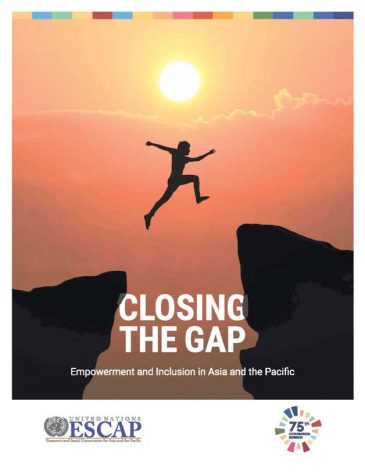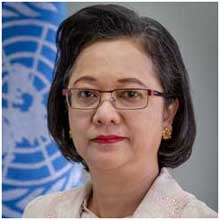Asia-Pacific Region Viewed as Engine of the World Economy

BANGKOK, Thailand, May 28 (IPS) - Armida Salsiah Alisjahbana * is UN Under-Secretary-General and Executive Secretary of the UN Economic and Social Commission for Asia and the Pacific (ESCAP)
Since this Commission first met in 1947, our countries have travelled a long journey. Our economies are expected to become larger than the rest of the world combined, measured by purchasing power parity. It is often said the Asia-Pacific region is the engine of the world economy.
With multilateralism increasingly questioned, we have yet more to offer. We can provide the global leadership to collectively achieve a transformed and resilient society in our region.
Empowered societies working in concert to respond to challenges which transcend borders and accelerate progress towards the 17 Sustainable Development Goals.
With these challenges in mind, this Commission is our opportunity to reaffirm our shared responsibility and commitment to the ambition of the 2030 Agenda for Sustainable Development - to build on past successes and shape future priorities. Let me mention five areas, which I believe are central to achieving the transformation and resilience we need.

We must put people first and build a coherent response to population dynamics which are radically altering our societies and our economies. We can learn from each other as we strengthen policies, institutions and legislation to empower people and promote equality.
This effort should be complemented by work to strengthen regional cooperation on population development and social protection - but also to promote gender equality, disability rights and safe, orderly and regular migration.
Strengthening sustainable connectivity could make us more resilient to international trade tensions and deliver huge economic benefits. When it comes to transport and infrastructure connectivity, we have achievements on which to build - guided by international standards, UN norms and values.
The same ambition is needed for energy connectivity, information and communications technology (ICT) connectivity and trade facilitation measures.
We have an opportunity to join forces to strengthen our work to combat environmental degradation, pollution and the mismanagement of natural resources. To protect our oceans there is no alternative to stepping up our multilateral cooperation.
Transformed and resilient societies can only be achieved if we stop disaster risk outpacing resilience. Intensified by climate change, disasters are five times more likely to affect a person in Asia-Pacific than a person living elsewhere.
The basis for stronger regional cooperation is well established. Let us use it to give pace to the development of national disaster risk reduction strategies.
New technologies have the potential to accelerate our journey to transformed and resilient societies on many fronts. Digital healthcare and education are providing cost effective solutions at scale.
Smart cities, energy systems and transport solutions are offering alternatives to protect the environment. Yet for digital solutions to be unleashed as a force for good, their broader implications need to be fully understood and the necessary infrastructure developed.

An enabling environment, investment and technological, individual and institutional capacity are all needed. ESCAP should be a forum for best practice exchange to harness digital technology for sustainable development.
The Regional Roadmap for Implementing the 2030 Agenda for Sustainable Development is a framework which will continue to guide our work. Yet we should also continuously sharpen our policy focus as the situation evolves - including to respond to these five priorities.
From an institutional perspective, ESCAP and the United Nations system are working to remain fit for purpose. You will be discussing the midterm review of this Commission's conference structure during this session. The United Nations Development System reform is well underway. It has moved to its regional phase.
In this broader context, I have established an Eminent Persons Advisory Group and am seeking views from all interested parties. Our goal is to identify how we can better serve the needs of our member States and deepen meaningful engagement with all our partners.
I believe a reenergised approach to supporting transformed and resilient societies is coming into focus.
At subregional level, ESCAP's partnerships with subregional organisations must be strengthened. Where common objectives exist, we must work to complement each other. Where best practice can be shared, ESCAP can facilitate such exchanges.
We are supporting the development of a Complementarities roadmap with ASEAN under the leadership of Thailand and will be a partner in its implementation. I would like to explore similar initiatives with other subregional institutions.
A coherent regional level approach is becoming increasingly important to overcome challenges which transcend borders and strengthen the means of implementation such as financing for development, data and statistics. In Asia-Pacific, least developed countries, landlocked developing countries and small island developing States must remain our priority. We should also scale up our support for middle-income countries to ensure their aspiration are met.
I am committed to working with all member States to achieve transformed and resilient societies. The evidence indicates we can be more effective if we empower citizens to support this transformation.
At this 75th session of the Commission, I am honoured by the presence of Her Royal Highness Princess Maha Chakri Sirindhorn who has shown great dedication to this cause in Thailand. I look forward to benefiting from her experience.
Let me also thank the Royal Thai Government for hosting ESCAP in Bangkok for the past seventy years, and all member States for their longstanding, unwavering support. I am looking forward to joining forces with all of you to accelerate progress towards sustainable development in Asia and the Pacific.
*In an address to the 75th session of the United Nations Economic and Social Commission for Asia and the Pacific (ESCAP), Bangkok.
© Inter Press Service (2019) — All Rights Reserved. Original source: Inter Press Service
 Global Issues
Global Issues